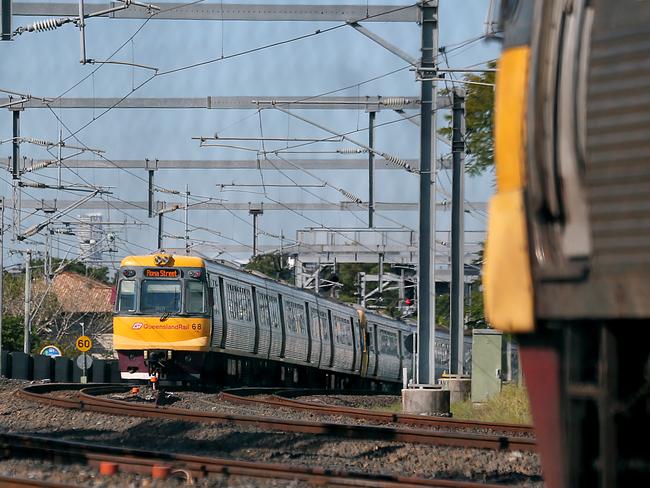Editorial: Queensland Rail reform should extend throughout public service
EDITORIAL: The damning report into Queensland Rail’s timetabling debacle is a wake-up call for other arms of the state government.
Opinion
Don't miss out on the headlines from Opinion. Followed categories will be added to My News.
WAITING for Stirling Hinchliffe to do the right thing and resign as transport minister has been a bit like waiting for one of Queensland Rail’s now non-existent train services.
After three months of rolling scheduling problems, sudden cancellations and commuter anger,
Mr Hinchliffe finally bowed to the inevitable and resigned from Cabinet yesterday.
There is no doubt, as Premier Annastacia Palaszczuk said, that the Queensland Rail debacle has taken an immense personal toll on Mr Hinchliffe and his family. And to be fair, he has seen the delivery of what is an extraordinarily damning Commission of Inquiry report from independent consultant Phillip Strachan.
The same could also be said, though, of the thousands of commuters who have been left stranded, delayed or crammed into overcrowded carriages as a result of QR’s inability to manage timetabling and driver staffing issues.
Likewise the affair will have taken a heavy toll on QR’s frontline staff, who have been asked to work extraordinary levels of overtime to make up for management’s failure to train enough drivers to cater for an expanded rail network.
Ultimately Mr Hinchliffe made the correct decision, but it should also serve as a lesson to all in Cabinet that the proverbial buck does stop at the ministerial desk, and a proactive and critical approach to managing complex portfolios is a must in the modern era.
The Strachan report, though, provides as many opportunities for renewal as it does recriminations.
Firstly it hands Ms Palaszczuk the chance to reshape her slimmed-down Cabinet into a more workable and focused team.
As it stands, some of the most senior ministers of her 17-member Cabinet are saddled with multiple and disparate portfolio responsibilities.
Mr Hinchliffe’s resignation gives her the opening to remedy this via a reshuffle of Cabinet that allots discrete portfolio responsibilities in key areas such as delivery of a world-class Commonwealth Games next year, and to refine her frontline team ahead of what will be a bruising election year.
This should not be viewed as any sort of backdown, but rather the sensible realisation that at the moment some senior ministers are overworked and distracted by multiple demands, and that ultimately the voters of Queensland value effective government and optimal service delivery over business as usual.

The other opportunity the report provides is a wake-up call for other arms of government to take a forensically honest look at their own operating procedures, governance and risk-management systems and assess whether they too are not suffering from some of the same structural and cultural failures that plague QR.
It is hard to imagine that in a public service of more than 200,000 full-time workers, with multiple service delivery functions and oversight of tens of billions of dollars’ worth of government-owned corporations, that in some cases the same culture of “intuitive decision-making, complacency, and reluctance to sharing bad news” that the Strachan report identified at QR has not also taken root.
If the Government wants to avoid another “rail fail” fiasco it would be well advised to apply the same rigorous analysis of departmental and GOC structures and systems to areas beyond QR.
In this regard, the Government could use more outside talent – people not aligned to its own political interests or those of the unions – of the calibre of Phillip Strachan when it comes to keeping its own house in working order.
To her credit, Ms Palaszczuk’s decision to appoint Mr Strachan, a no-nonsense former Rio executive, as chairman of QR is a sensible one, and a move that should be replicated in other areas of government where a culture of complacency could also use a new broom.

In the meantime, though, the great challenge is going to be transforming QR from the mess that currently exists into a modern service and results-focused GOC. This, as Mr Strachan details, will not happen overnight.
In the absence of an expanded train driver base, there is no quick fix for the ongoing reliance on an understaffed driver pool willing to come in on scheduled leave and work overtime, with the report concluding that QR “faces a continued risk of service cancellations”.
This, it says, means that operational strain will mount in critical periods such as Easter, testing and training for new rolling stock, and next year’s Commonwealth Games. As it stands we are looking at a two-year repair job before services are returned to normal.
Quite simply we can’t wait that long, and nor, if it wants to survive the next election, can the Government.
This means some very tough decisions, especially when it comes to enterprise bargaining arrangements which see restrictive work practices – such as the inability to advertise externally for driver positions – hobbling efforts to modernise the monolith that is QR.
If Ms Palaszczuk is serious about giving Mr Strachan the tools to turn QR around she may have to be prepared to lose some friends in the unions in the process. A failure to make hard-nosed sacrifices may cost a lot more votes.


